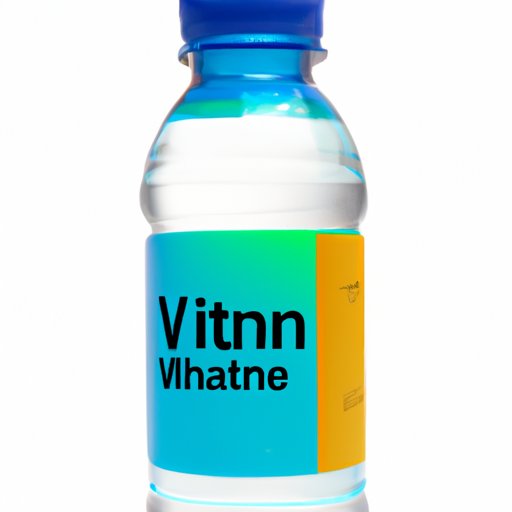
Introduction
Vitamin Water has become a popular beverage choice for many people due to its catchy marketing campaign and claims of being a healthier alternative to soda. However, with concerns over sugar consumption on the rise, many consumers are wondering if Vitamin Water is actually a healthier option. In this article, we will explore the sugar content of Vitamin Water and the implications of consuming sugary drinks.
The Truth About Vitamin Water: Sugar Content Revealed
Vitamin Water is marketed as a “nutrient-enhanced water beverage” with added vitamins and minerals. However, it is also important to note that Vitamin Water contains sugar. In fact, one bottle of Vitamin Water can contain up to 32 grams of sugar, which is equivalent to 8 teaspoons of sugar.
The main ingredients in Vitamin Water are water, sugar, and natural flavors. The added vitamins and minerals are listed as “less than 1% of the daily value” and are mostly in the form of synthetic nutrients.
Counting Calories: How Much Sugar is in Vitamin Water?
The caloric content of Vitamin Water varies depending on the flavor, but on average, one bottle of Vitamin Water contains around 120-130 calories. As previously mentioned, one bottle can also contain up to 32 grams of sugar.
Consuming sugary drinks like Vitamin Water has been linked to an increased risk of obesity, type 2 diabetes, and other health problems. The American Heart Association recommends limiting added sugars to no more than 6 teaspoons per day for women and 9 teaspoons per day for men.
Understanding the Label: Decoding Vitamin Water’s Sugar Content
Reading the label of Vitamin Water can be confusing, but it is important to understand what you are consuming. One of the main sources of sugar in Vitamin Water is crystalline fructose, which is a type of sweetener derived from corn syrup. High fructose corn syrup has been linked to several health problems, so it is important to be aware of its presence in Vitamin Water.
Other sweeteners used in Vitamin Water include cane sugar, which is a less processed sugar, and erythritol, which is a sugar alcohol that has fewer calories than regular sugar but can still cause digestive issues in some people.
Healthy Hydration: Alternatives to Sugar-Laden Vitamin Water
There are plenty of healthy and delicious alternatives to sugary drinks like Vitamin Water. Some options include:
- Plain water with a slice of lemon or lime for flavor
- Coconut water, which is a natural source of electrolytes and can be found in many flavors
- Herbal teas, which can be enjoyed hot or cold and come in a variety of flavors
- Sparkling water, which can be a refreshing alternative to sugary sodas
- Fruit-infused water, which can be made by adding slices of fruit to a pitcher of water for a fun and flavorful beverage
Drinking water and other low-calorie beverages is a great way to stay hydrated and avoid the negative health effects of consuming too much sugar.
Stay Hydrated and Informed: Everything You Need to Know About Vitamin Water’s Sugar Content
In summary, Vitamin Water does contain sugar, and one bottle can contain up to 32 grams of sugar, which is equivalent to 8 teaspoons of sugar. It is important to be mindful of your sugar intake, as consuming too much sugar can lead to several negative health consequences. When reading the label of Vitamin Water, be sure to look for sources of added sugars like crystalline fructose and cane sugar.
There are plenty of healthy alternatives to sugary drinks like Vitamin Water. By choosing water, herbal teas, coconut water, and other low-calorie beverages, you can stay hydrated and improve your overall health.
Conclusion
Making informed decisions about what we drink is important for our overall health and well-being. When it comes to Vitamin Water, it is essential to be aware of its sugar content and understand the implications of consuming sugary drinks. By choosing healthy alternatives and being mindful of our sugar intake, we can take control of our health and make positive changes in our lives.





